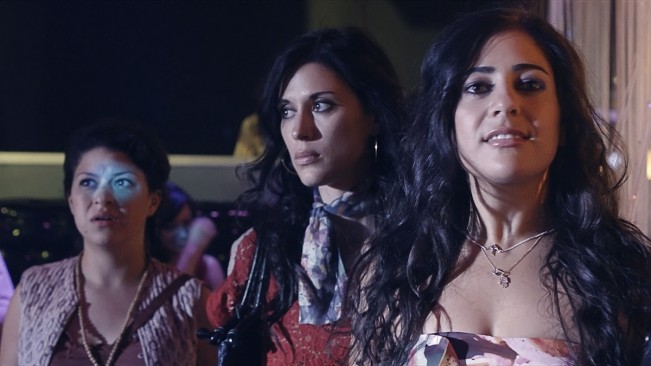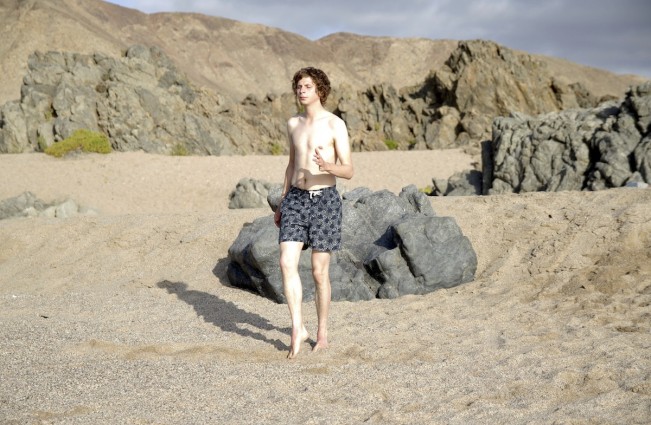By Jake Howell jake.howell@utoronto.ca
Sundance Review: May In The Summer; Crystal Fairy
On Thursday, Sundance’s opening night, four films from four separate programs kicked things off to varying degrees of success: Cherien Dabis’ May in the Summer (U.S. Dramatic), Sebastian Silva’s Crystal Fairy (World Dramatic), Morgan Neville’s 20 Feet from Stardom (U.S. Documentary), and Marc Silver’s Who is Dayani Crystal? (World Documentary). The films played well—about as well you could hope for opening night attractions to perform, anyway. That said, from the chats I’ve had on the shuttle to on-line conversations with other members of the press corps, it would appear that 20 Feet from Stardom was the real winner on opening day, garnering enthusiasm from audiences and attention from Harvey Weinstein (who bought the film on Friday). The film is a toe-tapping doc about the back-up singers involved with some of the biggest names in music, including Sting, Bruce Springsteen, and the Rolling Stones.
Cherien Dabis’ sophomore feature (returning to Sundance after critical hit Amreeka) finds the director-writer-actor in a slump. May in the Summer, which is a little like how I imagine Keeping Up with the Kardashians would be if it were an elegant Jordanian dramedy, is about a dysfunctional but affluent family where Mom, Dad, and their three daughters all have issues (though these issues are best described as “first world problems”). May, Dabis’ title character, is second-guessing her upcoming marriage; Mom has found God yet manages to contradict Biblical morals. Dad is cheating on his mistress (yes, you read correctly), while May’s two sisters are struggling with their respective sexual quagmires. While the film is light on emotional impact and overall relatability, the film is constructed with some stunning location photography and moments of poignancy (a scene with an overhead fighter jet breaks the surface tension of their small-fish concerns in an earth-shattering instant).
According to online reactions, the first divisive film of Sundance ’13 is Crystal Fairy (subtitled: Crystal Fairy and the Magic Cactus and 2012), the drug-infused side project from director Sebastian Silva (2009’s The Maid). With Crystal Fairy, Silva sends his three real-life brothers and a bushy-haired Michael Cera on a mescaline adventure in the Chilean desert. Gaby Hoffmann plays the film’s title role, a moon-gazing Earth Mother type who joins the boys after a loose invitation is extended her way. With her alternative healing methods and out-there perspectives on the natural world, Crystal fits awkwardly within the established group dynamic, bewildering the trio but irritating Jamie (Cera).
Yet despite Crystal’s idiosyncrasies, it becomes clear that the real weirdo here is Jamie. As the American traveling in Chile is selfish, impatient, and wants only to party, their road trip invokes a side of his character that obnoxiously wears horse blinders: stealing a San Pedro cactus for its psychoactive mescaline is his only concern, leaving the film to eventually teach Jamie a lesson about slowing down and appreciating some of the finer things in life. If you can believe it, this is the most detestable role Michael Cera’s ever delivered.
With the irritating Jamie alongside the zany (and often buck-naked) Crystal, the comedy set-up here is what likely what you’d expect–the jokes are scattered and enjoy a middling amount of laughs. Fortunately, the newcomer Silva boys are genuinely charming, and their interactions with Crystal raise some interesting philosophical questions about life and we choose to live it. These scenes work well to add substance to Crystal Fairy, but the film suffers major drawbacks from its uneven craftsmanship and inexcusable camerawork. Shots are often completely out of focus, proper lighting is at a premium, and the handheld shaky-cam reflects the hastiness in which the film was made (at the Q&A, it was mentioned Silva shot the project in 12 days—without a script, for that matter). It is sloppy.
Then again, uneven filmmaking is simply part of the game at Sundance–first-time filmmakers and established auteurs share an equal spotlight in the festival’s manifesto and general programming. There’s plenty more to see and write about than these two forgettable ventures, and it is interesting to see which film will rise to the surface and pierce our collective consciousness. I’m not sure anything has just yet, but we’ll see. At day four, the festival has hit its stride and I’ve tried my best to fill my days with movies and little else. As I operate in and around Park City, taking in the heritage of a town once dominated by the mining industry, it’s fun to imagine film-goers here as prospectors of a sort; sifting through the piles to find gold amongst the rocks.


















Strange and inaccurate review of May In The Summer. If the reviewer had been paying attention instead of equating all middle eastern women to the Kardashians, he might have noticed that the bill pullman character wasnt cheating on his mistress, but rather his second wife, for one thing…
Hi KR,
You are correct in stating he was cheating on his second wife – of course, his second wife is the woman he left his first wife for. In other words: then a mistress; later a wife. I took liberties in describing her as the former because of how shallow their relationship is as it plays on screen. Alas.
Hello,
You say the characters have “First world problems”. Were you expecting to see misery, war and rape just because the movie is set in an Arab country? You expect that people in the Arab world don’t grapple with love, faith, relationships and sexuality? This movie is about human emotions, subtly and poignantly depicted, and they are what makes us all similar and relatable.
Your review simply displays how shallow your analysis is.